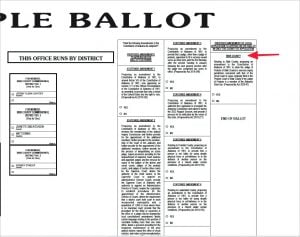The November 3 General Election Ballot will have proposed statewide and local constitutional amendments for you to vote on. The old rule of “vote No on everything” may not be in your best interest so you might want to know what a Yes vote on the amendments will do since a couple of them are pretty technical and a read at the poll to make your decision is not recommended.
Below is a plain language summary of each statewide amendment offered by the Fair Ballot Commission. The complete text of the fair ballot commission summary is available at the link:
Statewide Amendment 1
The state constitution grants the right to vote to U.S. citizens who meet certain requirements. This amendment does not change those requirements.
If a majority of voters vote “yes” for Amendment 1, the state constitution will grant the right to vote to “only” those U.S. citizens who meet the requirements.
If a majority of voters vote “no” for Amendment 1, the state constitution will continue to grant the right to vote to “every” U.S. citizen who meets the requirements.
Statewide Amendment 2
This amendment proposes six changes to the state’s judicial system. In summary, this amendment:
1. Provides that county district courts do not have to hold city court in a city with a population of less than 1,000;
2. Allows the Alabama Supreme Court, rather than the Chief Justice, to appoint the Administrative Director of Courts;
3. Increases from 9 to 11 the total membership of the Judicial Inquiry Commission and determines who appoints each member (the Judicial Inquiry Commission evaluates ethics complaints filed against judges);
4. Allows the Governor, rather than the Lieutenant Governor, to appoint a member of the Court of the Judiciary (the Court of the Judiciary hears complaints filed by the Judicial Inquiry Commission);
5. Prevents a judge from being automatically disqualified from holding office simply because a complaint was filed with the Judiciary Inquiry Commission; and
6. Provides that a judge can be removed from office only by the Court of the Judiciary.
If a majority of voters vote “yes” on Amendment 2, these provisions become law.
If a majority of voters vote “no” on Amendment 2, there will be no change to current law.
Statewide Amendment 3
This amendment changes the initial term of a judge that is appointed to fill a vacancy due to death, resignation, retirement, or removal. The current law and this proposed amendment do not apply to probate judges.
Under current law, the initial term of office for a person appointed to fill a vacancy in a judgeship shall last until the first Monday after the second Tuesday in January following the next general election held after the person has completed one year in office or the remainder of the original term of the judge elected to the office which is vacant, whichever is longer. The term of the appointment could vary widely due to the years left in the original term. At the election, the judicial office shall be filled for a full term.
Under this amendment, a judge appointed to fill a vacancy shall serve an initial term lasting until the first Monday after the second Tuesday in January following the next general election held after the person has completed two years in office. At the election, the judicial office shall be filled for a full term.
If the majority of the voters vote “yes” on Amendment 3, the initial appointment to fill a judicial vacancy will last until the first Monday after the second Tuesday in January after two years of service before a general election to fill the judicial office.
If the majority of the voters vote “no” on Amendment 3, then the length of appointment to fill a judicial vacancy will not change.
Statewide Amendment 4
Alabama’s constitution can be changed only during a constitutional convention or when a majority of voters approve a constitutional amendment.
If a majority of voters vote “yes” on Amendment 4, the Alabama Legislature, when it meets in 2022, would be allowed to draft a rearranged version of the state constitution. This draft could only (1) remove racist language, (2) remove language that is repeated or no longer applies, (3) combine language related to economic development, and (4) combine language that relates to the same county. No other changes could be made.
Even if passed by the Alabama Legislature, this rearranged version would not become law until it was approved by a majority of voters.
If a majority of voters vote “no” on Amendment 4, the Alabama Legislature could not draft a rearranged version of the state constitution.
Statewide Amendment 5
Relating only to Franklin County
Alabama’s “Stand Your Ground” law allows a person to legally use physical force against another person under certain conditions. The law does not require the person to retreat before using physical force.
If a majority of voters in Alabama vote “yes” on Amendment 5, and if, in addition, a majority of voters in Franklin County vote “yes” on Amendment 5, the state constitution would contain a special “Stand Your Ground” law that applies to churches in Franklin County only.
If a majority of voters in Alabama vote “no” on Amendment 5, or, if a majority of voters in Franklin County vote “no” on Amendment 5, the state constitution would not contain a special “Stand Your Ground” law that applies to churches in Franklin County.
Statewide Amendment 6
Relating only to Lauderedale County
Alabama’s “Stand Your Ground” law allows a person to legally use physical force against another person under certain conditions. The law does not require the person to retreat before using physical force.
If a majority of voters in Alabama vote “yes” on Amendment 6, and if, in addition, a majority of voters in Lauderdale County vote “yes” on Amendment 6, the state constitution would contain a special “Stand Your Ground” law that applies to churches in Lauderdale County only.
If a majority of voters in Alabama vote “no” on Amendment 6, or, if a majority of voters in Lauderdale County vote “no” on Amendment 6, the state constitution would not contain a special “Stand Your Ground” law that applies to churches in Lauderdale County.
Local Amendment – Bibb County Only
Relating to Bibb County, proposing an amendment to the Constitution of
Alabama of 1901, to allow the Judge of Probate of Bibb County to exercise equity
jurisdiction concurrent with that of the circuit court in cases originally filed in the
Probate Court of Bibb County if the Judge of Probate is a member of the Alabama
State Bar. (Proposed by Act 2020-91)
Bibb County Sample Ballot
Click here to view, download, and print, a copy of the general election sample ballot.















